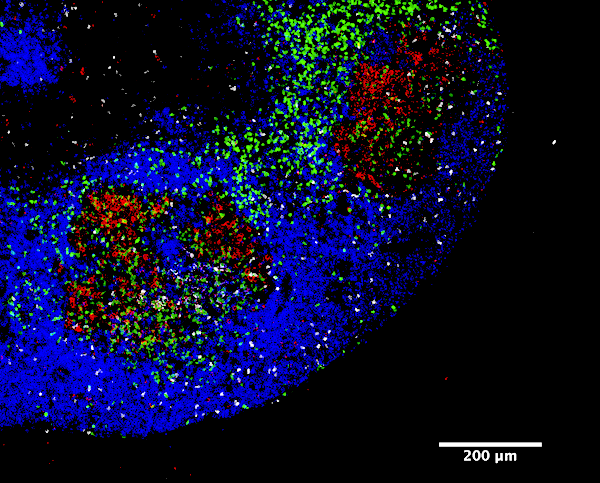Strep Throat
Strep throat is one of a several conditions, among them pneumonia, scarlet fever, impetigo, and flesh-eating necrotizing fasciitis, caused by the bacterium Streptococcus pyogenes, better known as group A Streptococcus (GAS). Each year, some 600 million people worldwide contract strep throat, many of them children. Strep throat is easily treated with antibiotics; however undiagnosed or untreated strep throat can have serious complications, such as acute rheumatic fever, a major cause of acquired heart disease among young adults.
Recurrent strep throat in children is also a problem worldwide. Even after antibiotic treatment, some children who experience recurrent strep will need to have their tonsils removed. Like any surgery, tonsillectomy involves risks, and some feel that loss of tonsils increases incidence of upper respiratory tract diseases over time. Thus, LJI scientists continue to grapple with the mystery of why some children are more susceptible than others to contracting the disease.
Our Approach
Work from the lab of LJI vaccinologist Shane Crotty, Ph.D., suggests that recurrent tonsillitis (or strep throat) has a genetic basis. Working with infectious disease expert Jennifer Dan, M.D., Ph.D., he studies the immune cell populations in children with different disease susceptibility.
Their goal was to identify immune activities potentially unique to either susceptibility group, with a focus on specialized sites called germinal centers, which reside in tonsils and other lymph nodes. There, B cells pair up with a type of T cell called a follicular helper T cell (Tfh cell), whose job is to “help” the B cell produce efficient antibodies. Interestingly, children with recurrent tonsillitis had consistently smaller germinal center areas than did children with a normal rate of infection. And, the germinal centers seen in tonsils of strep-susceptible children contained fewer B and Tfh cells.
Moreover, evaluation of a large number of children hinted that conditions associated with recurrent strep susceptibility runs in families, suggesting a genetic component. Crotty and Dan have since conducted genetic testing and identified two specific genetic variants in the HLA genomic region—one variant that is associated with increased susceptibility to recurrent tonsillitis and another that protects against the disease.
These LJI-led studies suggest molecular strategies to make a novel vaccine to stimulate a protective immune response and prevent recurring bouts of strep throat.
Related News
- Research News




